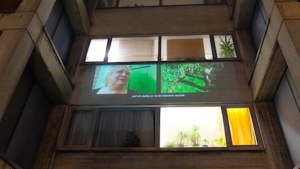by Danny Mackay
The Hamburg Collective returned to Glasgow with their event, ‘A Wall is A Screen’ (AWIAS) on the 18th of March, the penultimate day of the Glasgow Short Film Festival. The festival, which celebrated it’s tenth anniversary this year, is Scotland’s largest celebration of short film and rounded up old favourites to commemorate the occasion. This is the second time the event has been held in Glasgow, the first being in 2015 when over 600 people attended and took to the streets to watch the pop up screenings at outlandish locations throughout the city.
The event is free and is not ticketed, allowing people to join in at any stage. Another note that is written within the details posted on the Glasgow Film website stated “Please come dressed for March weather” and it was important information to let soak in. Rain pelted down onto the ground on what appeared to be a miserable Saturday evening but as I rounded the corner onto Argyll Street the sight of two flags being flown at the station entrance symbolised that the luckless conditions would have no effect on the event’s running. One flag with the AWIAS logo across it and the other with a rainbow pattern which almost seemed to be metaphorically opposing the weather on it’s own.
As I walked through the station onto Osborne Street, I could see a sizeable crowd had already gathered underneath the shelter opposite the Argos building which was emblazoned with the now familiar sight of the AWIAS logo. Speakers were set up either side of the projector and all of the gear was covered with waterproofs allowing the guerrilla screenings to take place. Those curating the event would diligently transport all this equipment across six different locations through out the city culminating at the Old College Bar on High Street, a public house that has stood since 1515.

The occasion is pitched as part city tour and part outdoor film screening. It is this concept which makes the AWIAS work. After watching each film, the short walk to the next space location allows attendees to let everything sink in and share their views on each film. Some of the films were more enticing than others. Highlights included the first screening, an animated film entitled “Never Drive a Car When You’re Dead” by Gregor Dashuber where a pianist leads a parade of degenerates through out the city on a funeral march and the ultimate screening of “Sid and Burt” a tale of two friends where the dialogue is entirely from the Beatles ‘She Loves You.’ The screening of “Sid and Burt” by Andreas Winsvold was poignant. It is set in a vacant industrial area and it conjures up the realisation that the Old College Bar seems to be lost to the past, having already had its doors shut once before.
The two films that made the most out of their screening location’s were “Best Sound” by Josh Polman and “a Film” by Franziska Kabisch. “Best Sound” was a short about the sound of the weekend. It captures two friends, one drinking a crate of beer and one recording the noises of everything that happens resulting in him using these to create a song by the end of the film. The image of a young man drinking beers like there was no tomorrow projected onto the side of a bar in the Merchant City had a comical appropriateness about it. “A Film” is about the problems that come with terms and labels and this resonated deeper as it was screened on Argyll Street, in the midst of Glasgow’s illustrative consumerism. The surroundings helped the message of the films to resonate more deeply than if they had been projected onto a screen in a cinema or hall somewhere.
The idea is a creative one and it allowed people to see films in places and ways they never have before and probably never will again (unless AWIAS returns once again). The members of the Hamburg Collective were endearingly thankful to all those who braved the weather with numerous members taking turns on the megaphone to offer their appreciation. The highlight had to have been the crowd being decorated as the ‘hardest’ they had ever come across until they corrected themselves and explained they meant ‘toughest.’ It was almost serendipitous as there wasn’t really a need for any correction because they are one in the same in Glaswegian, and a bit of rain wasn’t going to stop anybody.










